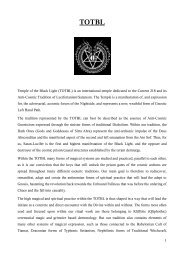Satanism Today - An Encyclopedia of Religion, Folklore and Popular ...
Satanism Today - An Encyclopedia of Religion, Folklore and Popular ...
Satanism Today - An Encyclopedia of Religion, Folklore and Popular ...
Create successful ePaper yourself
Turn your PDF publications into a flip-book with our unique Google optimized e-Paper software.
Appendix II: 1992 FBI Study <strong>of</strong> Satanic Ritual Abuse 311<br />
lem. Nothing is more simple than “the devil made them<br />
do it.” If we do not underst<strong>and</strong> something, we make it<br />
the work <strong>of</strong> some supernatural force. During the Middle<br />
Ages, serial killers were thought to be vampires <strong>and</strong><br />
werewolves, <strong>and</strong> child sexual abuse was the work <strong>of</strong><br />
demons taking the form <strong>of</strong> parents <strong>and</strong> clergy. Even<br />
today, especially for those raised to religiously believe so,<br />
satanism <strong>of</strong>fers an explanation as to why “good” people<br />
do bad things. It may also help to “explain” unusual,<br />
bizarre, <strong>and</strong> compulsive sexual urges <strong>and</strong> behavior.<br />
Second, the conspiracy theory is a popular one. We<br />
find it difficult to believe that one bizarre individual<br />
could commit a crime we find so <strong>of</strong>fensive. Conspiracy<br />
theories about soldiers missing in action (MIAs),<br />
abductions by UFOs, Elvis Presley sightings, <strong>and</strong> the<br />
assassination <strong>of</strong> prominent public figures are the focus<br />
<strong>of</strong> much attention in this country. These conspiracy theories<br />
<strong>and</strong> allegations <strong>of</strong> ritual abuse have the following<br />
in common :<br />
self-proclaimed experts,<br />
tabloid media interest,<br />
belief the government is involved in a cover-up, <strong>and</strong><br />
emotionally involved direct <strong>and</strong> indirect victim/witnesses.<br />
On a recent television program commemorating the<br />
one hundredth anniversary <strong>of</strong> Jack the Ripper, almost<br />
fifty percent <strong>of</strong> the viewing audience who called the<br />
polling telephone numbers indicated that they thought<br />
the murders were committed as part <strong>of</strong> a conspiracy<br />
involving the British Royal Family. The five experts on<br />
the program, however, unanimously agreed the crimes<br />
were the work <strong>of</strong> one disorganized but lucky individual<br />
who was diagnosed as a paranoid schizophrenic. In<br />
many ways, the murders <strong>of</strong> Jack the Ripper are similar to<br />
those allegedly committed by satanists today.<br />
If your child’s molestation was perpetrated by a<br />
sophisticated satanic cult, there is nothing you could<br />
have done to prevent it <strong>and</strong> therefore no reason to feel<br />
any guilt. I have been present when parents who believe<br />
their children were ritually abused at day care centers<br />
have told others that the cults had sensors in the road,<br />
lookouts in the air, <strong>and</strong> informers everywhere; therefore,<br />
the usually recommended advice <strong>of</strong> unannounced visits<br />
to the day care center would be impossible.<br />
Alternative Explanations<br />
Even if only part <strong>of</strong> an allegation is not true, what then is<br />
the answer to the question “Why are victims alleging<br />
things that do not seem to be true” After consulting<br />
with psychiatrists, psychologists, anthropologists, therapists,<br />
social workers, child sexual abuse experts, <strong>and</strong> law<br />
enforcement investigators for more than eight years, I<br />
can find no single, simple answer. The answer to the<br />
question seems to be a complex set <strong>of</strong> dynamics that can<br />
be different in each case. In spite <strong>of</strong> the fact that some<br />
skeptics keep looking for it, there does not appear to be<br />
one answer to the question that fits every case. Each case<br />
is different, <strong>and</strong> each case may involve a different combination<br />
<strong>of</strong> answers.<br />
I have identified a series <strong>of</strong> possible alternative<br />
answers to this question. The alternative answers also<br />
do not preclude the possibility that clever <strong>of</strong>fenders are<br />
sometimes involved. I will not attempt to explain completely<br />
these alternative answers because I cannot. They<br />
are presented simply as areas for consideration <strong>and</strong><br />
evaluation by child sexual abuse intervenors, for further<br />
elaboration by experts in these fields, <strong>and</strong> for<br />
research by objective social scientists. The first step,<br />
however, in finding the answers to this question is to<br />
admit the possibility that some <strong>of</strong> what the victims<br />
describe may not have happened. Some child advocates<br />
seem unwilling to do this.<br />
Pathological Distortion<br />
The first possible answer to why victims are alleging<br />
things that do not seem to be true is pathological distortion.<br />
The allegations may be errors in processing reality<br />
influenced by underlying mental disorders such as dissociative<br />
disorders, borderline or histrionic personality disorders,<br />
or psychosis. These distortions may be manifested<br />
in false accounts <strong>of</strong> victimization in order to gain psychological<br />
benefits such as attention <strong>and</strong> sympathy (factitious<br />
disorder). When such individuals repeatedly go<br />
from place to place or person to person making these<br />
false reports <strong>of</strong> their own “victimization,” it is called<br />
Munchausen Syndrome. When the repealed false reports<br />
concern the “victimization” <strong>of</strong> their children or others<br />
linked to them, it is called Munchausen Syndrome by<br />
Proxy. I am amazed when some therapists state that they<br />
believe the allegations because they cannot think <strong>of</strong> a<br />
reason why the “victim,” whose failures are now<br />
explained <strong>and</strong> excused or who is now the center <strong>of</strong> attention<br />
at a conference or on a national television program,<br />
would lie. If you can be forgiven for mutilating <strong>and</strong><br />
killing babies, you can be forgiven for anything.<br />
Many “victims” may develop pseudomemories <strong>of</strong><br />
their victimization <strong>and</strong> eventually come to believe the<br />
events actually occurred. Noted forensic psychiatrist Park<br />
E. Dietz (personal communication, Nov. 1991) states:<br />
Pseudomemories have been acquired through<br />
dreams (particularly if one is encouraged to keep a<br />
journal or dream diary <strong>and</strong> to regard dream content<br />
as “clues” about the past or as snippets <strong>of</strong> history),<br />
substance-induced altered states <strong>of</strong> consciousness<br />
(alcohol or other drugs), group influence (particularly<br />
hearing vivid accounts <strong>of</strong> events occurring to<br />
others with whom one identifies emotionally such<br />
as occurs in incest survivor groups), reading vivid<br />
accounts <strong>of</strong> events occurring to others with whom
















